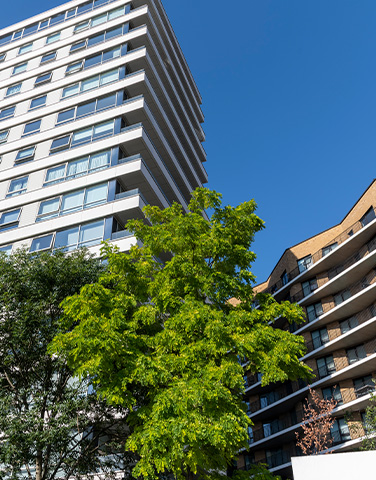
No Fault Evictions: The End of Section 21
The biggest shake up of the private rented sector in 30 years
A major reform of the private rented sector focused on no fault evictions has been on the cards for some time now. On 16 June, we moved a step closer to it by the release of the Government’s White Paper, “A Fairer Private Rented Sector” (“the White Paper”) as part of its levelling up agenda. The proposals seek to address a number of concerns including poor quality housing which the Government says is preventing neighbourhoods from thriving, tenants facing a lack of security, the expense of frequent moves and tenants feeling that they can’t put down roots in their communities or hold stable employment. Whilst it is hoped that the proposals will go some way towards addressing these problems, the Government will need to be careful to ensure the changes are not counter-productive to the issues that they are trying to combat.
Housing quality
Decent homes standard
The Government will introduce a legally binding Decent Homes Standard (DHS) in the PRS. There is already a DHS for social housing and it hard to see why anyone would object to it being extended to the PRS. Any responsible landlord is likely to be more than meeting the legal requirements in any event. The issue will be the enforcement of the DHS and ensuring that local councils have the resource to do so. The White Paper talks about implementing pilot schemes with selected local councils to trial improvements to the enforcement of existing standards.
Ombudsman
All private landlords who rent out property in England will be required to join an Ombudsman scheme. The White Paper envisages that this will enable tenants to have redress for free where they have a complaint about their tenancy (whether that be the behaviour of their landlord, the standard of the property or where repairs have not been completed within a reasonable time), without having to resort to court. The Ombudsman’s powers will include requiring a landlord to take remedial action and/or paying compensation of up to £25,000. It is hoped that this will free up some court time (presumably dealing with housing disrepair claims), so the court can prioritise the more serious cases.
Property portal
The Government will create an electronic property portal. Landlords will be legally obliged to register the property on the portal and tenants will be able to access it to check compliance with legal requirements. Local authorities will be able to take enforcement action against private landlords that fail to join the portal.
Housing security
One of the key (and most radical) provisions in the White Paper is the abolition of so-called “no fault evictions” and what is described as the simplification of tenancy structures.
Abolition of no fault evictions
Most residential tenancies in the PRS are assured shorthold tenancies (ASTs) and can be terminated by a landlord (after expiry of the initial fixed term or upon exercising a landlord’s break option) by serving 2 months’ notice. A landlord does not have to give reasons and the tenant does not have to be at fault. A landlord will no longer have the ability to do so.
Single tenancy structure
The Government will also do away with ASTs (and the now lesser used assured tenancies) altogether to create a single system of periodic tenancies. It appears therefore that tenants will not have to commit to a minimum fixed term. They will have complete flexibility, the only proviso being that in order to terminate their tenancy they will be required to serve 2 months’ notice on the landlord. Landlords however will only be able to terminate the tenancy in pre-defined circumstances set down by legislation.
It’s not clear as yet whether residential tenancies that are currently excluded from assured or AST status would come within the new regime – that would include tenancies where the landlord is a company; where the rent exceeds £100K per annum and where the property is not the tenant’s only or principle home.
Strengthened grounds for possession
The Government recognises the need for landlords to be able to recover possession in certain circumstances and the White Paper proposes to strengthen the existing grounds upon which possession can be sought. For example, a new ground is to be introduced for landlords who want to sell their property and to allow landlords and close relatives to move into the property. A new mandatory ground will also be created meaning that a court must make an order for possession in circumstances where a tenant has been in at least 2 months’ arrears 3 times within the previous 3 years.
The existing grounds for possession are either mandatory (meaning that, if made out, the court must make an order for possession) or discretionary (meaning that, if made out, the court may make an order for possession if it considers that it is reasonable to do so). The intention appears to be to keep that distinction between the grounds. A common source of complaint at the moment is that, where the court has discretion, there is no certainty whatsoever, and this will put many landlords off relying on those grounds. Take for example the anti-social ground, one person’s idea of what constitutes anti-social behavior that is serious enough to justify a possession order being made can differ starkly to another’s, and judges are no different. This would be a good opportunity to give more clarity/certainty on those grounds.
Whilst the Government has rightly recognised the dissatisfaction among private landlords of the court process for recovering possession, as well as the unacceptable delays, to the disappointment of many in the PRS, it has rejected the idea previously floated of a specialist housing court. Instead, it refers to court reforms targeting areas that particularly hold up possession proceedings, such as availability of bailiffs, and says that it will work with the MoJ and HCMTS in that respect. The danger is that if the proposals become law before any reform has taken effect, it will be too little too late.
Restrictions on rent reviews
As far as the rent goes, the provisions include only allowing rent increases once each year, banning rent review clauses that don’t reflect changes in the market price, improving tenants’ ability to challenge rent increases in the tribunal, and giving the Government a power to limit the amount of rent that can be charged in advance, which will be used if “the practice of charging rent in advance becomes widespread or disproportionate”.
Other restrictions
It will be illegal for landlords to have blanket bans on renting to tenants on benefits and/or families with children.
Landlords will not be able to unreasonably refuse consent when a tenant requests to have a pet in their home, and the tenant will have a right to challenge any decision. Landlords will be able to require pet insurance so that any damage caused to the property is covered.
Timing
The Government has said that it will implement the changes in two parts: it will provide at least 6 months’ notice of the date from which all new tenancies will be periodic; and at least a further 12 months’ after that, all existing tenancies will transition into the new regime. PRS landlords would be well advised to use that time to ensure that their tenancy agreements are as comprehensive as possible and to ensure that they have the right systems in place to cater for the new tenancy structure.
The verdict?
Many in the industry will have witnessed first-hand the steady decline in the PRS until ASTs were created in 1989, due in part to the high levels of regulation (in particular in the Rent Acts) imposing rent controls and giving tenants security of tenure. Since 1989, the PRS has been, by comparison, less regulated and this has coincided with the growth of the sector.
Over recent years, there has been a move by some larger landlords to voluntarily offer tenants greater degrees of security in recognition of the benefits that that can bring to those tenants, the communities and indeed to the landlords themselves (for example reducing void periods and administrative costs associated with renewing tenancies).
It is perhaps the smaller landlords (for example those owning just one second home and renting it out for an income) who are likely to be harder to convince to stay within the sector. They generally do not have deep pockets and the financial impact of a tenant remaining in possession who is not paying rent or causing damage to the property can be devastating. In fact, some concerning anecdotal evidence suggests that some of those landlords are already serving notice to terminate tenancies in the wake of the publication of the White Paper.
Getting the process for recovering possession right will be key to the success of the reforms. Both the detail in the drafting of the grounds for possession and the court reforms that have been promised will be absolutely crucial to that – landlords needs to know that when they have to recover possession for good reasons, they can do so quickly. It is essential that all PRS landlords (from the corporate landlords to the individual buy to let landlords) have confidence in the system to ensure that the sector flourishes and the Government succeeds in its mission to deliver a fairer, more secure and higher quality PRS.
Further help and advice
We await with anticipation the publication of the Bill which is expected to happen soon. We will provide further details once it is available. If in the meantime you would like to discuss the issues arising from the White Paper further, please contact Laura Southgate in the property disputes team.
Talk to us about
Related services
Related sectors















